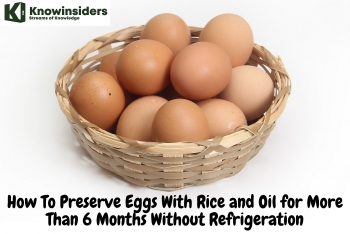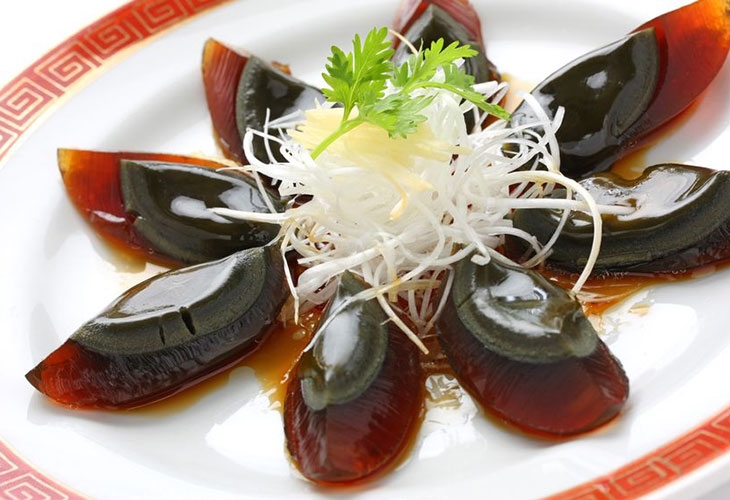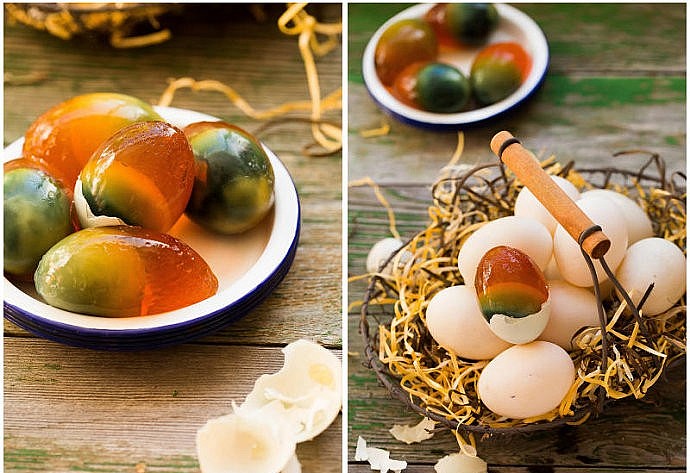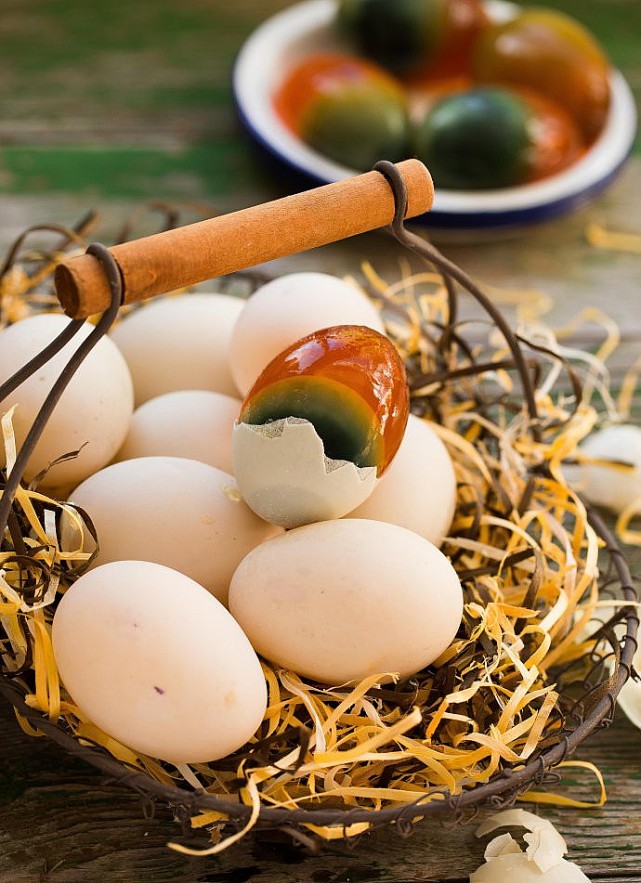What is the Century Eggs (Preserved Duck Eggs) - The World's Weirdest Dishes
 How Many Calories Are In 2 Eggs? How Many Calories Are In 2 Eggs? |
 How To Preserve Eggs With Rice and Cooking Oil for 6 Months Without Refrigeration How To Preserve Eggs With Rice and Cooking Oil for 6 Months Without Refrigeration |
 |
| What is the Century Eggs? Photo: Devour.Asia |
The vast majority of Chinese people agree that Century Eggs are extremely tasty. Typically, saltier and fresher-tasting duck eggs are used.
It has its own distinct color and flavor as well. The Century Egg enjoys widespread popularity in China and a respectable reputation abroad.
What is the Century Eggs?
The preserved egg, also known as a century egg, hundred-year egg, thousand-year egg, skin egg, and black egg, is offered in establishments ranging from the most modest to those with three Michelin stars.
They have a slimy, moss green or blackish center and are dark brown in color. Century eggs are a unique Chinese preparation in which chicken, quail, or duck eggs are kept for weeks or months in a mixture of clay, ash, salt, quick lime, and rice hulls before being eaten.
The catch is that because of the eggs' high sulphur and ammonia content, they are known to release a potent urine-like odor.
Century Eggs: Accidental Origins
The history of preserved eggs dates back to the Ming Dynasty (1368–1644) and most likely has its roots in Hunan Province in central China.
According to Hou Xiangchuan in the peer-reviewed academic journal Food and Nutrition Bulletin, "methods have been developed in China to preserve eggs in such a way as to cause chemical and physical changes in both egg white and yolk, imparting a new flavor." Wang Zizhen's account from the Ming Dynasty is the earliest description of an egg preservation technique that is currently known.
According to Cheung Long-yin, executive Chinese chef at the Kowloon Shangri-La, "it gives an acquired fragrance of egg, with a slight odor of ammonia, but it tastes like egg on the palate, with a creamy and succulent flavor."
According to Cheung, the perfect egg should have a yolk that is slightly runny, gooey, and creamy, with a few yolk specks sticking to the knife after cutting the egg in half.
How to Eat the Century Eggs
 |
| Century Eggs and Salted Duck Eggs have become the most popular flavored eggs in Asia |
A typical way to enjoy the eggs is by pairing them with pickled ginger.
“There are several elements,” says Chan Yan Tak, executive Chinese chef at the Four Seasons in Hong Kong. “The egg is alkaline from its preservation process, and the acidity in pickled ginger brings it to a balance. In terms of texture, the egg is silky smooth, so when you eat it with crunchy pickled ginger, it enhances the flavors.”
| • Preserved eggs are also served as a topping for congee, said to be a good introduction for novices. • Numerous other dishes also include the eggs. • In Shanghai and Taiwan, they are combined with cold silken tofu, light soy sauce, young ginger, and sesame oil. • In Hong Kong, they can also be found in pastries as well as mooncakes. |
How to Make Century Eggs
 |
| Century Eggs Recipe – Homemade Method |
Step-by-step instructions on how to make the delicious Chinese delicacy pidan at home.
Ingredients
→ 12 fresh duck eggs
→ 1L Water
→ 25g Loose leaf black tea (or about 10 teabags)
→ 40g food grade sodium hydroxide (NaOH)
→ 50g Salt
→ 150g Beeswax
Instructions
• In a large stainless steel pot, bring the water to a full boil. Take the pan off the heat, then stir in the salt and teabags until the salt is completely dissolved.
• Remove the teabags after allowing the tea to cool to room temperature.
• Pour the sodium hydroxide in gradually while donning protective gloves and working in a well-ventilated area. Mix until dissolved using a stainless steel tool.
• One at a time, carefully stir in the eggs to the mixture. I lowered them into the liquid using a slotted spoon made of stainless steel.
• Put a lid on the pot and write the date and contents on the label. For 24 to 30 days (lower end of range in summer, higher end of range in winter), store the pot in a cool, dark location that's safe from accidental opening or liquid spillage.
• The eggs must now be taken out of the sodium hydroxide tea and cured in a sealed container. Beeswax should be melted in a small double boiler; I used a heat-resistant glass dish inside a saucepan that was partially submerged in water.
• Bring your pot of eggs out of their secure storage while the wax is melting. Scoop the eggs out of the sodium hydroxide tea one at a time using a slotted spoon while wearing gloves. Rinse them thoroughly in cool water, then dry them off on a fresh towel.
• Pick up an egg (while wearing gloves, of course!) and dip it halfway into the beeswax once it has melted. For the egg wax to dry, place it in an egg cup wax side up. Return to the first egg and re-dip it in the wax (on the same side as before), then dip the remaining 11 eggs in the wax and place them in their egg cups. To completely encase each egg in a thick layer of wax, you should dip each egg three or four times in the wax on each side.
• Once all the eggs have been sealed and dried, store them in a container out of the refrigerator for a few more weeks or up to three months. Since they lose their freshness once opened, only take out what you need at once and keep the remaining items sealed in beeswax until you're ready to use them.
Increase the preservation time if the egg white has not firmed up.
We've used quail eggs several times to make our own Century Eggs. The preservation of quail eggs takes less time than that of duck eggs (typically only two weeks).
Once you've made these eggs successfully several times, you can flavor the solution that the eggs are preserved in by adding flavors like tea.
This approach is both easy and dependable.A few of my handmade Century Eggs are depicted in the following figure.
In the middle of the three-week preservation period, I opened the container and lightly tapped the eggs to see if they had solidified.
The surface of the egg develops lovely snowflake-like patterns as a result of this gradual process, adding to their uniqueness.
These eggs were oxidized yellow from the inside to the outside because I did not vacuum-pack them, but the taste was unaffected.
FAQ: Century Egg
Are century eggs healthy?
With high levels of iron, protein, and vitamin D, century eggs are a nutritional powerhouse and a great swap for regular eggs. It is understandable why they have been adored for centuries given these advantages.Do I need to boil century egg?
Enjoy eggshells' flavor like never before! Once you've given it a thorough rinse and peeled them back like you would a hard-boiled egg, this no-cook treat is ready to tickle your taste buds.Do century eggs expire?
When properly stored, eggs are a pantry essential with a remarkable shelf life. Some people even believe that eggs never actually go bad!
What country eats century egg?
Many Asian nations, especially China, enjoy century eggs as a delicacy. They are also becoming more and more well-liked in other parts of the world thanks to their distinct flavor and advantageous health properties.Is century egg high in uric acid?
Enjoy a delicious breakfast without worrying about gout or high uric acid thanks to chicken and duck eggs. However, century eggs should be avoided as they are high in purine.Why does century egg turn black?
Century egg turns black due to the chemical reaction that occurs during the curing and fermenting process. This reaction is what gives century eggs their distinct flavor and texture.How long are century eggs kept for?
Century eggs are an amazing feat of food preservation; they are like edible time capsules because they can be stored for years without refrigeration. Their shelf-stability makes them an easy addition to any kitchen pantry, but beware: once they've been opened and exposed to the air, they need the cold embrace of the refrigerator to preserve all that timeless goodness.How long do century eggs sit?
The time it takes for century eggs to develop the desired flavor and texture will determine how long they sit. Depending on how it is prepared, this process can typically take two weeks to several months.Is century egg good for diabetics?
Even though century eggs are a delectable treat, people with diabetes or heart disease should limit their consumption. In addition, to prevent potential health risks, pregnant women and children should avoid these delicacies.What’s the oldest century egg?
The oldest century egg ever recorded is believed to be about 200 years old. It was discovered in a Chinese tomb and is kept in the Forbidden City Museum in Beijing, China.Are century eggs raw?
Century eggs are a delicacy that need to be prepared carefully to get their distinctive flavor. They go through an aging process that raises the pH of the egg to bring out all of its flavor potential. Alkaline agents like wood ash, lime, tea, and salt are used in this process. You won't soon forget the finished product!
Conclusion
The century egg is a delicacy in many parts of Asia, especially China and Vietnam. They are a good source of protein and other nutrients that can help you feel healthier and fight off illness.
They are a good choice for people with diabetes because of their low sugar content. They should be kept in a cool, dry place and, if submerged in water, the water should be changed regularly. Before eating an egg, it's vital that you examine it for signs of spoilage or contamination. Although properly stored century eggs can keep for months, including them in your diet should be done so with caution.
 ONLY in SAUDI ARABIA: Top 17 Weirdest Things ONLY in SAUDI ARABIA: Top 17 Weirdest Things From royal family, great food, energetic atmospheres of Riyadh and Jeddah- and many more. A lot of people are familiar with Saudi Arabia’s history, customs ... |
 ONLY in BELGIUM: 7 weirdest things only Belgians could understand! ONLY in BELGIUM: 7 weirdest things only Belgians could understand! How well do you know Belgium? A beautiful country with lots of famous sightseeing? Do you know that in Belgium there are some weird things ... |
 ONLY in CUBA: 7 Weirdest Things only Cubans could understand ONLY in CUBA: 7 Weirdest Things only Cubans could understand ONLY in CUBA: The following are 7 strange things about Cuba. If you want more detailed information, check out this piece of information to broaden ... |























